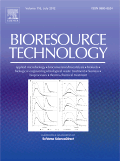
BIORESOURCE TECHNOLOGY
Scope & Guideline
Leading the Charge in Sustainable Resource Utilization
Introduction
Aims and Scopes
- Bioconversion Technologies:
Research on the conversion of biomass and waste materials into biofuels, bioproducts, and biochemicals using microbial, enzymatic, and thermochemical processes. - Waste Management and Valorization:
Studies focusing on the sustainable management of agricultural, industrial, and municipal waste through innovative bioprocessing techniques to recover nutrients and energy. - Environmental Biotechnology:
Investigation of microbial processes for environmental remediation, including wastewater treatment, pollutant degradation, and nutrient recovery. - Microbial Metabolic Engineering:
Development and optimization of microbial strains for enhanced production of value-added products, including lipids, proteins, and biopolymers. - Machine Learning and Data Analysis:
Application of computational techniques and machine learning models in optimizing biotechnological processes and predicting outcomes in bioconversion systems. - Biochar and Soil Amendments:
Research on the production and application of biochar from biomass and its role in improving soil health, carbon sequestration, and nutrient retention.
Trending and Emerging
- Integrated Bioprocessing Systems:
An increasing trend towards systems that combine multiple processes, such as anaerobic digestion and microbial electrolysis, reflects a holistic approach to resource recovery and waste management. - Microbial Electrochemical Technologies:
Research on microbial fuel cells and electrosynthesis is gaining momentum, focusing on the conversion of waste to energy while simultaneously treating wastewater. - Advanced Biorefinery Concepts:
Emerging studies emphasize the development of biorefineries that produce multiple high-value products from biomass, integrating various feedstocks and processes for sustainability. - Machine Learning Applications in Biotechnology:
The integration of machine learning techniques for optimizing bioprocesses and predicting outcomes is becoming increasingly prevalent, enhancing the efficiency of research and applications. - Biochar for Environmental Remediation:
Research on the use of biochar not only for soil amendment but also for the remediation of contaminated water and air is trending, reflecting a broader understanding of its multifunctional benefits. - Sustainable Wastewater Treatment and Resource Recovery:
Innovative approaches to wastewater treatment that focus on nutrient recovery and circular economy principles are increasingly prominent, showcasing the journal's relevance to environmental sustainability.
Declining or Waning
- Traditional Biogas Production:
Research specifically focused on conventional anaerobic digestion methods without integration of advanced technologies has diminished as new methods, such as microbial electrolysis and hybrid systems, gain traction. - Single-Product Biorefineries:
The focus on biorefineries producing a single product has decreased in favor of integrated systems that allow for multiple co-products, emphasizing circular economy principles. - Static Waste Treatment Methods:
Static or low-innovation waste treatment methods are being overshadowed by more dynamic, adaptive systems that utilize novel technologies and microbial enhancements. - Lignin Valorization through Conventional Means:
Lignin valorization through traditional chemical methods has waned as more efficient enzymatic and biological methods are developed and explored. - Basic Microalgae Cultivation Techniques:
Research focusing solely on basic cultivation methods for microalgae without addressing integrated systems or bioproduct recovery has seen a decline.
Similar Journals
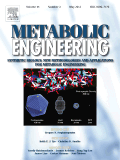
METABOLIC ENGINEERING
Redefining the Landscape of Applied MicrobiologyMETABOLIC ENGINEERING, published by Academic Press Inc. Elsevier Science, is a renowned journal in the fields of Applied Microbiology, Biotechnology, and Bioengineering. With an impressive impact factor and ranking in the top quartile (Q1) across its specialized categories for 2023, this journal facilitates the dissemination of cutting-edge research focused on metabolic pathways and engineering methods that optimize biological systems for various applications. Since its inception in 1999, it has established itself as a critical resource for academics and industry professionals seeking innovative solutions to complex biosynthetic challenges. The journal invites original research, reviews, and technical notes that advance the understanding and utilization of metabolic processes; thus, it plays a pivotal role in bridging laboratory discoveries with practical applications. Although the journal does not offer open access, its high visibility and rigorous peer-review process ensure that it remains a vital source of knowledge and inspiration for researchers and students alike.

Chemistry for Sustainable Development
Transforming Research into Sustainable PracticesChemistry for Sustainable Development is a leading journal dedicated to the exploration of innovative chemical studies that promote sustainability and environmental preservation. Published by the esteemed PUBLISHING HOUSE RUSSIAN ACAD SCIENCES, SIBERIAN BRANCH, this journal serves as a crucial platform for researchers, professionals, and students engaged in the field of chemistry, particularly those focused on sustainable practices and green technologies. With an ISSN of 0869-8538, the journal aims to bridge the gap between theoretical research and practical applications that align with sustainable development goals. By fostering interdisciplinary collaboration and sharing cutting-edge findings, Chemistry for Sustainable Development plays a vital role in addressing pressing global challenges such as climate change, resource depletion, and environmental degradation. Though currently not open access, the journal is committed to disseminating knowledge that inspires innovative solutions for a sustainable future.
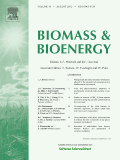
BIOMASS & BIOENERGY
Leading the Charge in Sustainable PracticesBIOMASS & BIOENERGY, published by Pergamon-Elsevier Science Ltd, is a premier academic journal focusing on the interdisciplinary fields of biomass and bioenergy research. With its impressive impact reflected in its 2023 Q1 rankings across multiple categories, including Agronomy and Crop Science, Forestry, Waste Management and Disposal, and a solid Q2 in Renewable Energy, Sustainability and the Environment, this journal stands at the forefront of advancing knowledge in renewable resources and sustainable practices. Established in 1991, it serves as a vital platform for researchers, professionals, and students to disseminate groundbreaking studies and innovative findings that shape the future of renewable energy. Though it does not currently offer open access, the journal's high ranking on Scopus, particularly its 95th percentile rank in key agricultural and environmental science categories, underscores its significance in promoting critical discourse and scientific advancements in biomass utilization and energy generation.

Biochar
Transforming Sustainability Through Biochar InnovationWelcome to Biochar, an esteemed academic journal dedicated to the exploration and advancement of biochar technology and its applications across multiple fields. Published by SPRINGER SINGAPORE PTE LTD, this journal serves as a vital platform for disseminating high-quality research that addresses the critical intersection of environmental science, soil health, and sustainable materials development. With a commendable Q1 ranking in the fields of Biomaterials, Environmental Science, Pollution, and Soil Science, Biochar is recognized for its significant impact, as evidenced by its placement in the upper percentiles across various Scopus rankings. Researchers and professionals in agricultural and biological sciences will find valuable insights and innovative methodologies that promote sustainable practices and enhance soil quality. This journal, operating from its base in Germany, is committed to fostering a collaborative environment where cutting-edge research can inform policy and practice. Engage with us as we strive to advance the science of biochar from 2019 to 2024 and beyond.

WASTE MANAGEMENT & RESEARCH
Leading the way in pollution and waste management insights.WASTE MANAGEMENT & RESEARCH, published by SAGE PUBLICATIONS LTD, is a premier journal dedicated to advancing the field of waste management and environmental concern. Established in 1983, this esteemed publication spans a comprehensive range of topics within Environmental Engineering, Pollution, and Waste Management and Disposal, with remarkable standings including a Q1 ranking in Environmental Engineering and a Q2 ranking in both Pollution and Waste Management and Disposal as of 2023. With an impressive Scopus ranking, placing it in the top percentiles of its categories, the journal serves as a vital resource for researchers, professionals, and students seeking to explore innovative solutions to waste management challenges. Although not an open access journal, its rigorous peer-review process ensures high-quality and novel research is made available to the academic community. Located in London, UK, WASTE MANAGEMENT & RESEARCH continues to be influential in shaping policies and practices that impact sustainable waste management practices worldwide.
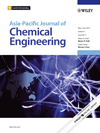
Asia-Pacific Journal of Chemical Engineering
Shaping Tomorrow's Innovations in the Asia-Pacific Region.The Asia-Pacific Journal of Chemical Engineering, published by WILEY, serves as a vital forum for the dissemination of innovative research in the interdisciplinary domains of chemical engineering, renewable energy, sustainability, and waste management. Established in 2006, this esteemed journal has achieved a notable impact factor that reflects its commitment to advancing knowledge and practices within the chemical engineering community. With its Q3 category rankings across various fields, including Chemical Engineering (Miscellaneous), Renewable Energy, Sustainability and the Environment, and Waste Management and Disposal, the journal holds a significant position among its peers, assuring readers of quality and relevance in published content. Although it does not offer Open Access options, the Asia-Pacific Journal of Chemical Engineering remains an essential resource for researchers, professionals, and students aiming to stay at the forefront of innovations affecting the Asia-Pacific region and beyond. The journal's broad scope covers diverse topics, making it an integral part of the academic landscape from 2006 to 2024.

Bioresources and Bioprocessing
Transforming Bioresources into Sustainable SolutionsBioresources and Bioprocessing is an esteemed open-access journal published by SPRINGER HEIDELBERG, dedicated to the innovative fields of biomedical engineering, biotechnology, food science, and renewable energy. Since its inception in 2014, the journal has rapidly established itself as a leading platform for high-quality research, boasting a Q2 ranking in key categories such as Biomedical Engineering and Biotechnology, and an impressive Q1 status in Food Science for 2023. With robust Scopus rankings placing it in the top percentiles across multiple disciplines, Bioresources and Bioprocessing serves not only as a conduit for original research but also for critical insights into sustainable bioprocessing techniques that contribute to environmental stewardship. It is particularly aimed at researchers, professionals, and students committed to advancing knowledge in the bioprocessing sphere, promoting evidence-based innovations that leverage biological resources for diverse applications. Emphasizing open access, the journal ensures that cutting-edge research is readily available to a global audience, reinforcing its commitment to scientific communication and collaboration.

Biofuels Bioproducts & Biorefining-Biofpr
Leading the Charge in Sustainable Bioenergy InnovationsBiofuels Bioproducts & Biorefining (Biofpr), published by WILEY, stands at the forefront of research dedicated to the sustainable production and utilization of biofuels and bioproducts. With its robust impact, as evidenced by its placement in the Q2 quartile across both Bioengineering and Renewable Energy, Sustainability and the Environment categories, this journal provides a vital platform for disseminating high-quality research aimed at advancing bio-refining technologies and bio-product innovations. Covering a wide range of topics from production methodologies to environmental impacts, Biofpr serves as an essential resource for researchers, professionals, and students eager to contribute to the evolving领域 of renewable energy solutions. Its consistent performance in the Scopus rankings further underscores its importance, ranking #78 in Renewable Energy and #51 in Chemical Engineering, making it an indispensable read for those committed to sustainability and scientific advancement in the biofuels sector.
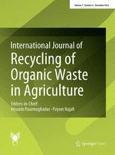
International Journal Of Recycling of Organic Waste in Agriculture
Driving Change: From Waste to Valuable Resources in FarmingInternational Journal of Recycling of Organic Waste in Agriculture is a pioneering open-access journal, established in 2012 and published by the Islamic Azad University, Isfahan-Khorasgan Branch, Iran. With ISSN 2195-3228 and E-ISSN 2251-7715, this journal focuses on innovative research and development in the field of organic waste recycling within agricultural contexts. As indicated by its latest metrics, it holds a respectable ranking in the Q2 quartile in Agricultural and Biological Sciences and Q3 in Waste Management and Disposal for 2023. This positions the journal as a valuable resource for professionals, researchers, and students invested in sustainable agricultural practices and waste management strategies. With its commitment to advancing knowledge and fostering interdisciplinary dialogue, the journal serves as an essential platform for disseminating significant findings that can positively impact environmental sustainability and agricultural productivity worldwide.
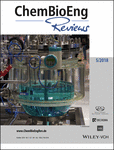
ChemBioEng Reviews
Pioneering Insights in Bioengineering and Chemical EngineeringChemBioEng Reviews is a premier academic journal dedicated to advancing the fields of biochemistry, bioengineering, and chemical engineering. Published by WILEY-V C H VERLAG GMBH, this journal serves as an essential platform for researchers and professionals seeking to disseminate groundbreaking insights and innovations. With a remarkable impact factor and a solid reputation, it is ranked in the top quartile (Q1) across multiple disciplines, including Biochemistry, Bioengineering, and Industrial and Manufacturing Engineering. The journal's comprehensive scope covers the synthesis, analysis, and application of bioengineered solutions, making it a vital resource for anyone involved in process chemistry and technology. With an unwavering commitment to high-quality scientific discourse from 2014 to 2024, ChemBioEng Reviews is not only pivotal for the academic community but also contributes to industry advancements in filtration, separation processes, and the intersection of chemical and biological engineering.